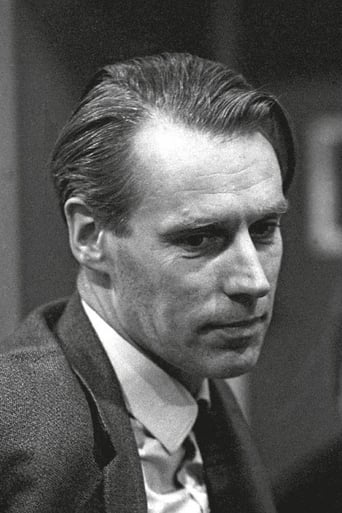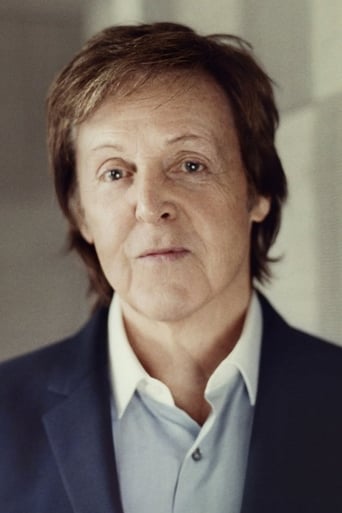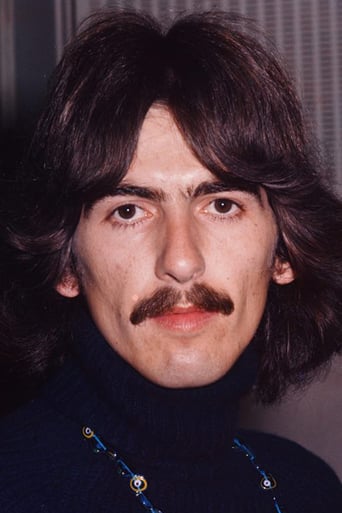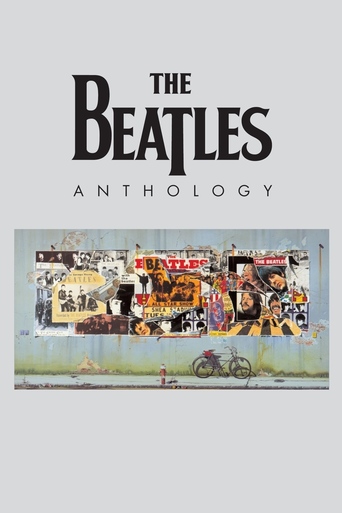
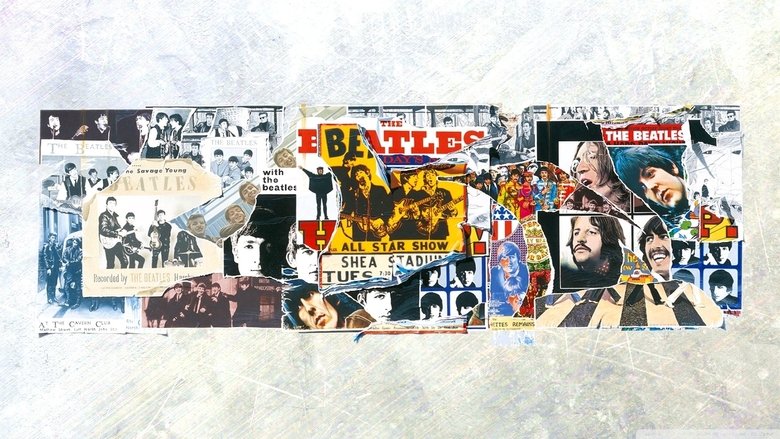
The Beatles Anthology (1995)
The Beatles Anthology documentary series was first broadcast in November 1995. The documentary used interviews with The Beatles and their associates to narrate the history of the band as seen through archival footage and performances. The initial volume of the album set was released in conjunction with the documentary in November 1995, with the subsequent two volumes released in 1996. The albums included unreleased performances and outtakes presented in roughly chronological order, along with two new songs based on demo tapes recorded by John Lennon after the group broke up. The book, released in 2000, paralleled the documentary in presenting the group's history through quotes from interviews.
Watch Trailer
Cast


Reviews
Just perfect...
While it doesn't offer any answers, it both thrills and makes you think.
what a terribly boring film. I'm sorry but this is absolutely not deserving of best picture and will be forgotten quickly. Entertaining and engaging cinema? No. Nothing performances with flat faces and mistaking silence for subtlety.
Blistering performances.
This is a staggering, fantastic eight-part documentary on the history of the Beatles as a group and as individuals, an oral history by them and those closest to them, including George Martin and Neil Aspinall, their tour director.Besides the Beatles music showcased so beautifully throughout the anthology, probably the best thing is the filmed discussions of Paul, George, and Ringo sitting around a kitchen table discussing their shared past. For me, the other remarkable thing is how they, in fact, seemed to have invented the music video without realizing it.The anthology goes into quite a bit of detail not only about how the guys grew up, got interested in music, got together, and got started but also a lot about what it was like to be "The Beatles" and how they collaborated. Their story is remarkable because, unlike a lot of other groups, they were always together -- not only making music but on vacations, in India, making movies, and in hotel rooms. They were kids together. And when they grew up, the band ended.There's not much else to say because if you're a Beatles fan, a baby boomer, whatever you are, you have to see this and experience it in all its brilliance. The end, with "Free as a Bird," is heartwrenching. This anthology is exciting, funny, bittersweet, sad, entertaining, and thought-provoking. What can I say? It's the Beatles.
While this 8-hour documentary could be called "authoritative" there is an uncomfortable revisionism that permeates the whole. Again it seems, ensuring the participation of Yoko Ono and compensating for her zealous desire to project a saintly image of John Lennon, has resulted in a serious lack of objectivity in this documentary. Paul McCartney, probably in defiance of Yoko Ono's controlling ways, has become equally controlling. So these two irreconcilable camps needed to find a middle ground that each could find acceptable and so the integrity and honesty of this documentary suffers.These collisions of ego forced the filmmakers to limit the scope of what should have been revelatory, uncompromising and above all, an honest film. By interviewing solely within the Beatles camp and not seeking alternate opinions from friends, family, witnesses and adversaries, it might have appeared "easier" to control the content of the message.This fundamental problem raises its head early in the series with the treatment of Pete Best, the first drummer in the band. He is not given the chance to tell his side of the story by way of interviews or archival footage. The "authoritative" view of his leaving the band is left unclear and shady. George Martin is more revealing and forthright by stating he simply was "not a good enough drummer" for their first recording session.The exclusion of family members and fellow musician testimony is detrimental. Is Cynthia Lennon no part of The Beatles story? Is Julian not part of The Beatles history? Would Mick Jagger be able to enlighten the audience about the working methods in the studio? Could Keith Richards reveal what recreational drugs they were experimented with? The bands consumption of hard drugs is handled with considerable caution. It is clear that these kids smoked "pot" almost as often as they lit a cigarette. It is also on record that John Lennon was seriously influenced and affected by his prodigious taking of hallucinogenic drugs. The effect of this on his character is left completely unexplored. His use of other hard drugs, such cocaine or heroin are never mentioned.The compelling character of Brian Epstein is also left unexplored. His homosexuality and influence on John Lennon is left untouched. Stuart Sutcliffe, another riveting character in The Beatles story, is sidelined early on and his premature death and its effect upon his friends is not mentioned.Much of the runtime of Anthology is taken up with playing complete Beatles songs with visual montages or promotional videos. This time would have been better used with exploring the creation of the music with detailed explanations from George Martin and other technicians present in the studio. The excellent "classic album" series formula could have been incorporated to study the individual albums in greater detail, as often these moments at the mixing desk are the most revelatory.Finally, after much delay, Yoko Ono enters the picture but rather than exploring her vandalising effect upon The Beatles as a unit, her appearances are smoothly edited to a minimum. The effect upon Paul McCartney at having to rehearse and sing to John Lennon while Yoko sat immovable at his side is not explored. Yoko's hard faced determination to be present at all rehearsals and recording sessions and Lennon's weakness at allowing such a situation to continue was without doubt the catalyst for the break up of the Beatles. This conclusion is barely mentioned. McCartney only refers to her presence in fleeting terms and it is evident that his comments are tailored to cause the least offence possible.George Martin's frustration with what The Beatles had become after Lennon's love life entered the studio is not broached. His comments about Yoko Ono walking into the control room and planting herself in his presence without even an introduction from Lennon and his remarks about her destructive influence on The Beatles recording procedure are omitted. His leaving the band during the recording of the "Let It Be/Get Back" album and the introduction of Phil Spector into the Lennon camp is also absent.The conditions of George Martin returning to produce Abby Road are left undefined but it is possible one important desire was too keep all disruptive elements out of the studio. The Abby Road recording is told to have been a very happy experience for all involved but any revelation about it's evolution and creation is absent.It is a shame that such an important and lengthy record of the Beatles phenomena is so compromised. What any Beatles fan should expect from the devotion of spending 8 hours of their lives in watching a Beatle documentary is unreserved truth and a little closure. If anybody can shed light on these extraordinary times it by those that lived through it.This documentary raises far more questions about the legacy of The Beatles than it answers.
This comment is on the ten hour version available on DVD.I'd advise approaching this with caution. What it will mean to you depends a lot on how old you are and what you look for in life.If you are not old enough to have lived through this, what you will get is the impression that The Beatles were something of a fad. They didn't matter much then, except economically, and matter even less now. The interviews with the older members of the group could give you the impression that they discount the period as well. Hey. It was fun, but that's that.If you believe that the world works as a collection of emergent forces which can produce lasting change in the universe; if you believe that The Beatles were unique and important agents in this...Then you will be profoundly disappointed by this.In 1968, we got an authorized biography of the The Beatles. It was a fluff piece that was part celebration and part disinformation. It was engineered by roadie Neil Aspinall, who in the confusion after Brian Epstein's death assumed control of Apple. This is his project as well, and it is of the same cloth. We do get interviews with the remaining Beatles, those alive at the time (plus lots from Neil himself). And we do get some of the public history and their songs. But we get none of the real things that were happening. We get no information from insiders and observers. We get absolutely no discussion of any kind on the religious and artistic controversies that were at the core of the dissolution.So far as John was concerned, we have only what Yoko would allow: that he was as saint. There's nothing about her affair with Paul, her enticing John into a lifelong heroin addiction. There's nothing about the radical shift into tarot and kabbalah. Nothing about his meanness.Paul comes off as utterly unlikable, which may be fair. But there's nothing about the Asher family experience which was the thing that inserted literacy into the equation. Nothing about Jane and Alice in Wonderland. Nothing about the amazing connections in the intellectual underground of the time and Pepper.George is surely the most at ease with himself, but it would have been nice for us to learn that in addition to be being genuinely spiritual, he is the most affected by appearance. We don't hear about his obsessions with gentlemanly surroundings, his cosmetic surgery, his racecars or experiments with soma-induced kundalini yoga.It would have been nice to hear why Ringo's naive but amazingly intuitive drumming spawned many of the songs, and why the others were in awe of his purported past lives.There are two main trunks of the narrative tradition, at least in the English-speaking world.One comes to us as human reflection. Its origins are Greek and reflected in the reinvention of the Bible as a Greek text. In popular life, it comes to us through Goethe, Bulwer-Lytton (yes, he matters) and the Kerouak/Ginsburg movement. Bob Dylan is our musical poet from the 60's in this line, and amazingly influential in shaping this thread. All modern irony finds it root here, and by this I mean the large class of symmetric/dissymmetric celebrations that we collectively call irony. And much of noir.This tradition because of the way it is put together writes its own history. So we have many projects, for instance on that man that was a giant, Dylan. (I'm waiting for the Tod Haynes project.)The other tradition uses external folds. It comes to us through Shakespeare, Joyce, Lewis Carroll and the Beatles. They are even more important in shaping how we dream, and the vocabulary of how many movies twist it. Its also highly reflective but from the viewer's perspective. We can see all the layers. We can build rich metaphors and ambiguities. Its the stuff of solar poetry, not the stuff of religious angst.But we have essentially no films that tackle the Beatles, excepting that ambitious Taymor project which dealt with the Beatles more as music machine than worldfolders. All we have, basically, is this. Part of the reason is that this branch doesn't value self-reflection unless it is describing it. We literally know more about Shakespeare than the three songwriting geniuses here. And so all of us waited for this, because we thought we might get some further insight into the nature of the game from 67-69. All of us had low expectations because its Neil's project and Yoko demanded that John only be depicted as a saint. But at least we thought that since they had their shot at exploiting the fab four one more time, we would at least see afterward some insight. I'm writing this 12 years after the Anthology was released, and we are worse off than before.Because all we have is this. Probably, all we will ever have is this. Its ten plus hours, and three serious minutes with any of their songs after 1966 will tell you more.Ted's Evaluation -- 1 of 3: You can find something better to do with this part of your life.
If you could roll the respective significance of `Citizen Kane,' `Gone With the Wind' and `Lawrence of Arabia' into one film, you might have somewhat of an idea what the Beatles mean to contemporary music. Indeed, while Elvis Presley, Chuck Berry and Buddy Holly laid the groundwork, the Beatles forever defined the musical and artistic boundaries by which all future pop players would be judged. Indeed, the DVD format has provided modern day audiences with a chance to see why the Fab Four's legacy is something much more significant than a mere history lesson. `The Beatles Anthology' (released April 1, 2003 on DVD) picks up where the 2002-issued collector's edition release of `A Hard Day's Night' left off, providing more insight into the minds and music of the band that put Liverpool on the map. In addition to the in-depth chronology taking viewers on a magical mystery trip through the 1960s, new and never-before-seen material features interviews with Paul McCartney, Ringo Starr and the late George Harrison at Abbey Road Studios in May 1995 as they listen to classic Beatles tracks with producer George Martin. The jewel of the release is additional footage of the three one-time mop tops jamming together in George Harrison's garden.DVD extras? You get them here. Indeed, the DVD release features a bonus disc featuring approximately 80 minutes of material more than the deluxe, eight-volume VHS release that expanded on the ABC special broadcast on Nov. 19, 22 and 23, 1995. Needless to say, all fans of rock music and 20th century pop culture should own this collection.


